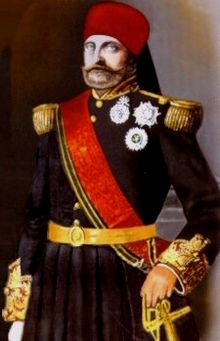Muhammad II al-Husain
Muhammad II. Al-Husain (* 1810 ; † September 21, 1859 in La Marsa ; Arabic أبو عبد الله محمد باشا باي) was from May 30, 1855 to September 21, 1859 as Mohammad Bey Bey of Tunis .
Muhammad II succeeded Ahmad I al-Husain ( 1837 - 1855 ), under whom the modernization of the country began. He tried above all to develop the infrastructure and had roads and bridges built and the first telegraph line laid in Tunisia . A Roman aqueduct was also restored to improve the water supply in Tunis. Even if attempts were made to finance these measures through increased taxes, the national debt continued to rise. As a result, the country became increasingly dependent on foreign, especially French, banks.
The most significant act of Muhammad II was the enactment of the "Fundamental Act" on September 10, 1857, in which all Tunisians were guaranteed civil rights and privileges and private monopolies were abolished. In addition, a "high council" of 60 members, with controlling and judicial powers, should restrict the power of the Beys somewhat. However, the implementation of this reform met with considerable resistance from the population. Muhammad II was succeeded by Muhammad III. al-Husain ( 1859 - 1883 ).
See also
literature
- Ulrich Haarmann : History of the Arab World. Edited by Heinz Halm . 4th revised and expanded edition. CH Beck, Munich 2001, ISBN 3-406-47486-1 ( Beck's historical library ).
- Stephan Ronart, Nandy Ronart: Lexicon of the Arab World. A historical-political reference work. Artemis Verlag, Zurich et al. 1972, ISBN 3-7608-0138-2 .
Individual evidence
- ↑ a b c Compilation of the Husainids on the website of the library of Cornell University , there Predecessors, pos. 11, viewed on June 22, 2009 (English)
| personal data | |
|---|---|
| SURNAME | Muhammad II al-Husain |
| BRIEF DESCRIPTION | Bey of Tunis (1855-1859) |
| DATE OF BIRTH | 1810 |
| DATE OF DEATH | September 21, 1859 |
| Place of death | La Marsa |
